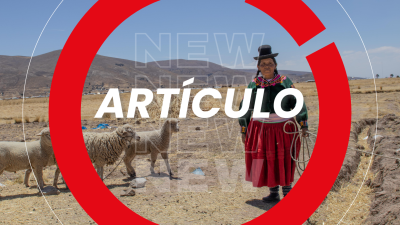The regional Andes Resilient to Climate Change project helps strengthen interaction between government and private players to provide services for improving poor and vulnerable Andean communities’ resilience and capacity to adapt to climate change, in order to improve their food and water security.

The national technical committee (NTC) of the regional project Andes Resilient to Climate Change in Peru was installed on 23 October, promoted by Swiss Cooperation’s Global Programme on Climate Change and Environment and facilitated by the HELVETAS Swiss Inter-cooperation and Fundación Avina consortium.
The committee is composed of the Ministry of the Environment (MINAM), the Ministry of Agriculture and Irrigation (MINAGRI) and the Ministry of Development and Social Inclusion (MIDIS) through the Social Development Cooperation Fund (FONCODES). The meeting approved jointly-drafted management documents, such as the committee regulations, the Action Plan for Resilient Andes in Peru going forward, and the operational plan for the last quarter of 2020.
Gabriel Quijandría, the Deputy Minister of Strategic Development of Natural Resources at MINAM, highlighted that it is extremely important for MINAGRI and FONCODES-MIDIS to be involved in particular projects with the communities, to resolve challenges emerging because of climate change in the Andes. He also said that it is important to have opportunities such as Resilient Andes for making contacts and building trust between government departments, because this will open the way to a common agenda for adaptation to climate change.
Fernando Mejía, executive director of FONCODES, said that the participation of MIDIS through FONCODES will strengthen the adaptation measures and provide the enabling conditions for the NDCs, as they are part of FONCODES’ strategies. He also reaffirmed his willingness to implement the plans drafted in coordination with the other national counterparts in the NTCs Peru.
Elvis García, Director of Agrarian Policy at MINAGRI, stressed that the Resilient Andes Action Plan, now has been agreed and approved, has great potential for complementing other initiatives and sector priorities, which will make the ministry’s work on climate change adaptation management more sustainable.
Cristina Rodríguez, Director of Adaptation to Climate Change and Desertification at MINAM, chaired the event as the coordinator of the Resilient Andes NTC in Peru. She noted that the priority activities of the three ministries in the project plan are well aligned with the climate change adaptation measures and enabling conditions for National Level Contributions (NDC) in the areas of agriculture and water. “The participation of FONCODES-MIDIS joins forces for this important challenge of increasing ambition and incorporating greater targets or new adaptation measures. It recognizes what Peru is doing to reduce climate change risks” she concluded.
The Resilient Andes project aims to provide a meeting-place for the three sectors, Environment, Agriculture and Social Inclusion, to strengthen their action together and with actors from Andean learning areas, and to enhance the results achieved through collaboration.
The national technical committees are national coordination agencies with a regional focus.
The session in Peru brought to a close the national technical committees’ planning cycle for the Resilient Andes regional project. In Ecuador, it was installed on 24 September and is composed of the Ministry of the Environment and Water (MAAE), the Ministry of Agriculture and Livestock (MAG) and the Ministry of Economic and Social Inclusion (MIES). In Bolivia, it is composed of the Plurinational Authority of Mother Earth (APMT), the Ministry of the Environment and Water (MMAyA), the Ministry of Rural Development and Land (MDRyT) and the Ministry of Development Planning (MPD), and was installed on 9 October.
The national technical committees will provide strategic guidance for the work of the Resilient Andes project, ensuring that their actions are in line with the strategic climate and sector priorities of each country, for adaptation to climate change, agricultural production systems, water management and economic and social inclusion. It is important that these committees have been created and installed, because they can catalyse coordination between different national and local players who can use their different competencies to pave the way for sustainable solutions to constraints on vulnerable rural Andean communities’ resilience and adaptation to climate change.
The Resilient Andes project will encourage peers to share experiences, knowledge and learning and foster south-south cooperation between the three countries. This will help implement the NDCs and tackle the challenges of climate change. Martin Jaggi, Head of Swiss Cooperation in the Andes, stressed the importance of the NTCs as bridges to a regional tripartite union and making regional proposals that help to position the Andes better on the international climate agenda.
In the post-COVID-19 reactivation, the Resilient Andes project will be an opportunity to ensure a sustainable recovery with a responsible climate outlook.
Contact Information
Lenkiza Angulo | Regional Coordinator, Andes Resilientes al Cambio Climático Project
Tel: +51 989 172 540 | lenkiza.angulo@helvetas.org








